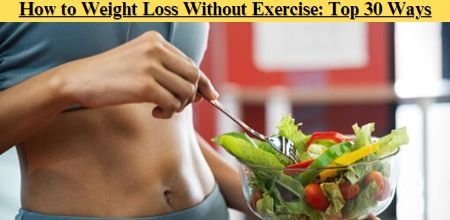
How to lose weight without exercise is a dream of every heavy-weight person. Picture this: indulging in your favorite foods without the fear of gaining weight. The idea of shedding pounds without the constraints of a strict diet or rigorous exercise is a dream for many.
If you’re among those who dread the monotony of a restrictive diet and grapple with maintaining it, prepare for a delightful revelation. You can indeed lose weight without dieting or exercising! That’s correct! We’ve compiled a list of 30 scientifically-backed strategies to lose weight without the need for a diet or exercise.
These tips are the hidden gems of weight loss, as they are universally effective. So, don’t merely skim through this article; implement these suggestions and witness sustainable results.
More about Weight Loss: You may also like
Trimspa Reviews: Unveiling the Truth About the Popular Weight Loss Supplement I Nutriwise Diet Plan: Is It Really Worth the Price? I Rep Fitness Sabre Bar Review: A Complete Guide I Booty Max Reviews: Do you Really Want to Know about it? I Bleamifyde Glute Trainer Reviews: Must Read I Pro Burn Keto Gummies Reviews: Unveiling the Truth about this Trendy Weight Loss Supplement
Top 30 Ways: How to Lose Weight without Exercise
1. Mindful Eating
“How to lose weight without exercise” begins with mindful eating. It’s about paying attention to your food and savouring every bite. According to research, mindful eating might help you feel more fulfilled with fewer meals and minimize overeating. Eat without distractions such as TV or your phone, and concentrate on the flavour, texture, and fragrance of your meal.
2. Hydrate Before Meals
Drinking water before meals might make you feel fuller, causing you to eat less. According to one research, participants who drank water before meals lost 44% more weight than those who did not. As a result, make it a habit to drink a glass of water 30 minutes before your meal.
3. Increase Protein Intake
Protein can reduce hunger and boost metabolism, helping you lose weight without exercise. Foods high in protein can make you feel fuller and reduce cravings. Try incorporating lean meats, eggs, and legumes into your meals.
4. Limit Processed Foods
Processed foods have a lot of added sugars, fats, and calories. They are intended to cause you to consume as much as possible, resulting in weight gain. Instead, choose entire meals such as fruits, vegetables, and whole grains.
5. Get Enough Sleep

Lack of sleep is linked to weight gain. Poor sleep can increase hunger and cravings, disrupt metabolism, and decrease your overall quality of life. Aim for 7-9 hours of quality sleep per night.
6. Reduce Sugar Intake
Excessive sugar intake is a major cause of weight gain. Be mindful of your sugar intake, especially from sugary drinks like soda and fruit juice. Opt for fresh fruits for a healthier alternative.
7. Eat Fiber-Rich Foods
Eating fiber-rich foods can help you feel fuller for longer, reducing overall calorie intake. Foods like fruits, vegetables, legumes, and whole grains are high in fiber.
8. Use Smaller Plates
Using smaller plates can trick your brain into thinking you’re eating more than you actually are. This can lead to less food intake and weight loss without the need for exercise.
9. Don’t Skip Meals
Skipping meals can lead to increased hunger and overeating later in the day. Instead, aim for regular, balanced meals throughout the day.
10. Limit Alcohol
Alcohol can contribute to weight gain due to its high-calorie content. Try to limit your alcohol intake, or opt for lower-calorie options.
11. Chew Slowly
Slowly chewing your meal can help you eat less and enhance the synthesis of hormones associated with weight reduction. It also improves digestion and increases meal satisfaction.
12. Keep Healthy Snacks Handy
Keeping healthy snacks on hand can prevent you from reaching for unhealthy options when you’re hungry. Opt for snacks like nuts, fruits, or yogurt.
13. Practice Portion Control
Portion control can help you lose weight by allowing you to eat all the foods you enjoy, just in smaller amounts. Use measuring cups or a food scale to ensure you’re not overeating.
14. Eat More Fruits and Vegetables
Fruits and vegetables are low in calories but high in fiber, making them perfect for weight loss. They also contain plenty of vitamins and minerals.
15. Limit Eating Out
When you eat out, you’re more likely to eat high-calorie foods and larger portions. Try cooking at home more often to control what goes into your food.
16. Cut Back on Refined Carbs
Refined carbs are stripped of their nutrient and fiber content, leading to rapid spikes in blood sugar and hunger. Opt for whole grains instead.
17. Eat Regularly
Eating at regular times during the day helps burn calories at a faster rate. It also reduces the temptation to snack on high-fat and sugar foods.
18. Keep a Food Diary
Keeping a food diary can help you track what you eat and identify any patterns or habits that could be hindering your weight loss. It’s a great way to stay accountable and make healthier choices.
19. Eat More Healthy Fats
Healthy fats like avocados, olive oil, and nuts can actually help you lose weight. They keep you full and satisfied, reducing the likelihood of overeating.
20. Don’t Drink Your Calories
Sugary drinks, like soda and juice, are a major source of empty calories. Stick to water, tea, or coffee (without added sugar) to cut down on unnecessary calories.
21. Manage Stress
Stress can lead to overeating and weight gain. Find healthy ways to manage stress, like meditation, yoga, or reading.
22. Eat Probiotic Foods
Probiotic foods, like yogurt and sauerkraut, can improve gut health and enhance weight loss. They can also help regulate your appetite.
23. Cook at Home
Cooking at home allows you to control the ingredients and portion sizes of your meals. It’s also typically cheaper and healthier than eating out.
24. Avoid Late-Night Snacking
Late-night snacking can lead to weight gain. Try to establish a regular eating schedule and stick to it, even on weekends.
25. Eat More Lean Proteins
Lean proteins, like chicken, fish, and tofu, can help you feel full and satisfied, reducing the likelihood of overeating.
26. Limit Packaged Foods
Packaged foods often contain hidden sugars and unhealthy fats. Stick to whole foods as much as possible.
27. Eat Breakfast Every Day
Eating a healthy breakfast can kick-start your metabolism and prevent you from overeating later in the day.
28. Limit Fast Food
Fast food is typically high in unhealthy fats, sugars, and calories. Try to limit your intake and opt for healthier options when possible.
29. Don’t Ban Foods
Completely banning certain foods can make you crave them even more. Instead, enjoy your favorite treats in moderation.
30. Listen to Your Body
Learn to listen to your body’s hunger and fullness cues. Eat when you’re hungry, and stop when you’re satisfied, not stuffed. This can help you maintain a healthy weight without the need for strict diets or exercise.
Final Thoughts

Now, you will come to know how to weight loss without exercise is indeed feasible by implementing a range of lifestyle modifications and adopting healthier habits. By incorporating the 30 strategies discussed earlier, you can make substantial progress toward your weight loss goals.
Embracing mindful eating practices, hydrating before meals, and increasing your protein intake are all effective ways to manage your weight effectively. Additionally, reducing your consumption of processed foods, prioritizing quality sleep, and limiting your sugar intake contribute to a healthier lifestyle and sustainable weight loss. Portion control, using smaller plates, and maintaining regular meal patterns are also crucial factors to consider.
It is essential to be attuned to your body’s signals, manage stress levels, and make informed choices regarding your dietary habits. While losing weight without exercise requires commitment and consistency, these scientifically-backed strategies provide a solid foundation for achieving the desired outcomes.
Embrace these tips, stay motivated, and witness the positive transformation they can bring to your overall well-being. Your weight loss journey begins today, and with dedication, success is within your grasp.
FAQs
There are numerous lifestyle habits that can assist you in achieving weight loss, and some of them don’t require following traditional diet or exercise plans. Making simple changes such as using smaller plates, practicing mindful eating by slowing down your pace, staying hydrated with water, and avoiding distractions while eating (like watching TV or using the computer) can make a significant difference.
Losing weight naturally in just 7 days requires a combination of healthy eating habits such as portion control, consuming nutrient-dense foods, staying hydrated, and engaging in physical activity.
Losing weight fast without exercise can be challenging, but it’s possible by focusing on your diet.
Losing 10 kg in 10 days is not a realistic or healthy goal. Rapid weight loss of such magnitude can be detrimental to your overall well-being and may involve extreme measures. Instead, focus on sustainable weight loss by incorporating a balanced diet, portion control, regular exercise, and healthy lifestyle habits.
